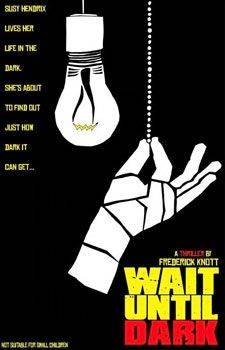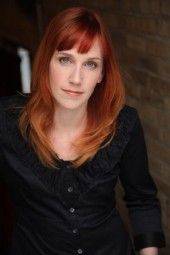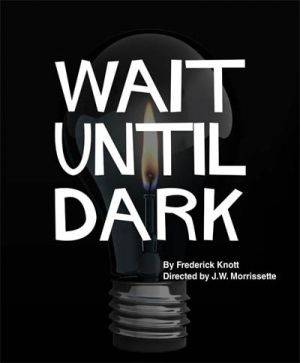 It’s one of my favorite premises ever: a blind woman matches wits with three criminals who want something she’s not sure she has. In Frederick Knott’s Wait Until Dark, the “something” is a doll which hides a valuable secret, and the blind woman is Susy Hendrix, a very capable protagonist who is still coming to terms with her lost sight. It is as tense a game of Cat & Mouse as you’re likely to find on the drama shelf. It has life-and-death stakes, a trio of villains as savvy as they are nefarious, and a heroine who turns a perceived disadvantage into an asset.
It’s one of my favorite premises ever: a blind woman matches wits with three criminals who want something she’s not sure she has. In Frederick Knott’s Wait Until Dark, the “something” is a doll which hides a valuable secret, and the blind woman is Susy Hendrix, a very capable protagonist who is still coming to terms with her lost sight. It is as tense a game of Cat & Mouse as you’re likely to find on the drama shelf. It has life-and-death stakes, a trio of villains as savvy as they are nefarious, and a heroine who turns a perceived disadvantage into an asset.
When the play debuted on Broadway in 1966, it starred Lee Remmick and Robert Duvall — both stellar stage and screen actors — as Susy Hendrix and her chief tormentor, Roat. In the subsequent, somewhat Hitchcockian film version (directed by Terence Young) Audrey Hepburn assayed the role of Susy and was nominated for an Academy Award for her performance. Playing Roat was a young, chilling Alan Arkin, who made every syllable he uttered both compelling and repellant.
The play has since been adapted for television (starring Katherine Ross and Stacy Keach) and resurrected on stage frequently. It’s easy enough to see why, of course: Knott’s script has a tight story, pulpy dialogue, and roles any actor would love to undertake.
This week, the cast of Parkland College Theatre’s production will unveil their take on this suspense classic, under the direction of JW Morrissette. I spoke with Morrissette as well as Cara Maurizi—who plays Susy Hendrix—to get their thoughts on the play and its challenges.
———
Smile Politely: So, Cara, here’s a pretty obvious question to start… Excited to play Susy?
 Cara Maurizi: I’m so excited about this play and this role. I first saw this play when my high school performed it in 1988. I think I was in eighth grade. It really made an impact on me, and I always hoped I’d have the opportunity to play the role. I’m thrilled. It’s been a great time ever since we were cast. Everyone is very dedicated and a lot of fun to work with.
Cara Maurizi: I’m so excited about this play and this role. I first saw this play when my high school performed it in 1988. I think I was in eighth grade. It really made an impact on me, and I always hoped I’d have the opportunity to play the role. I’m thrilled. It’s been a great time ever since we were cast. Everyone is very dedicated and a lot of fun to work with.
SP: JW, I’m always fascinated to know what led a director to choose a play. I happen to love Wait Until Dark, but for you, of all the plays you could have selected to direct, what made this show the One?
JW Morrissette: Fun fact — I was asked to direct this project; I did not propose it. However, I was absolutely excited about the idea of directing this show. I think it does things in live performance that can’t be experienced in any other way. It has all the great elements of a thriller that can only be experienced in the theater. Not to tell you too much about what happens, but the last 15 minutes are only possible in a live theater setting.
SP: I’m excited to see how that plays out, I have to say. Concerning casting, while “there are no small roles,” this play certainly has a couple of big ones: the female protagonist, Susy, and her primary tormentor, Roat. What made Cara and Zackary the right choices for these roles?
Morrissette: I think every actor brings so much of their own personality to their work; so, when casting a show, you have to meet an actor part-way. Put them in a place where you can see them bringing themselves to a role, and you’ve got it! Cara and Zach and the entire cast are taking these wonderfully vulnerable human beings and mixing them with their own particular point of view. The result is incredibly exciting and allows for a telling of this story that can only exist in this production. I have also worked with [Cara and Zach] before and know them to be incredibly dedicated to a process as well as wonderfully interesting on stage.
SP: Speaking of process… I have to believe that portraying blindness convincingly on stage takes some dedication and work. How did you and Cara go about achieving this?
 Morrissette: Cara honestly did most of the heavy lifting in her preparation for this element of the show. We gave her some challenges in rehearsal that allowed her to experience not using sight as the basis for all discovery and interaction, and she ran with it from there. It has been a system of her experimenting and me giving feedback on what she is doing. She has been very brave in the whole process.
Morrissette: Cara honestly did most of the heavy lifting in her preparation for this element of the show. We gave her some challenges in rehearsal that allowed her to experience not using sight as the basis for all discovery and interaction, and she ran with it from there. It has been a system of her experimenting and me giving feedback on what she is doing. She has been very brave in the whole process.
SP: How does one do that “heavy lifting,” Cara? What has your process been?
Maurizi: Playing blind is an interesting challenge. I asked JW from the beginning to keep on me and make sure that I was making it believable. From the very beginning, I have been working on making sure that I am always directing my attention towards the other player without making eye contact. It’s been a totally new perspective for me because I have completely relied on eye contact in every other role I’ve played. I always crave that connection as an actor. Eye contact is important for improv as well. So this took me out of my comfort zone. Instead of eye contact, I’ve been using my hearing a lot more. Sometimes, it’s easier, because I don’t have to be looking at something to be engaged. But in another sense, I feel a lot more vulnerable. There are a lot of things happening around me with the other players, that I have never seen. I don’t know if I ever will, unless the show is recorded. I think it’s more authentic that way, and I can truly live in my head and my reality, as I’m sure Susy does.
As for action, I have taken to counting my steps between pieces of furniture and other markers, counting stairs, and listening more for how sound bounces around the stage. I still rely on my sight for safety issues, but it’s almost as if my peripheral vision has been impaired and I can only zone in on what’s out in the distance. I’m pretty excited and scared for the climactic moments in this play, when I really will have to rely on my spacial knowledge and hearing. [Editor’s note: A portion of Ms. Maurizi’s response has been deleted at this point to avoid a potential spoiler. Sorry, Cara, and you’re welcome, everyone else.]
There are a lot of technical aspects to this show, and we have a great crew who have been really supportive throughout this process. We have been getting more and more of our set as we go, which helps to get familiar with Susy’s apartment. It’s really important that I am comfortable in my space for the situation.
 SP: I’ve enjoyed a lot of JW’s work over the years, Cara. Tell me about working with him.
SP: I’ve enjoyed a lot of JW’s work over the years, Cara. Tell me about working with him.
Maurizi: I love working with JW. He has been an actor, director, and casting director, so he has been on both sides of the stage. I think this allows him to really understand what it takes to create a compelling play. He is really respectful of our time and does a great job of chunking our rehearsals so that we really can build something special. I like the way he has structured our journey so that we are growing together as a cast and building this reality. A lot of times, directors just don’t know how to allow the actors to find their voices, but JW has trusted us from the beginning and just guides the way so that we can all shine. I truly appreciate it and I think the others do too.
SP: Having been in the position of promoting shows before, JW, we know all the usual preview questions… What drew you to this project? What was it like to work with so-and-so? (In fact, I’ve asked them both.) So… tell me something I don’t know about this play.
Morrissette: Something you don’t know about this play…. Some may be familiar with the movie version of this work, but the genius of the play is seeing it done live. I can’t tell you all the details—who would want to ruin the surprise?—but I can say that you probably have not experienced anything like the last 15 minutes of this show in any live theatre production.
———
This Thursday, February 13, JW Morrissette’s production of Wait Until Dark will open with a strong cast of local actors. In addition to Ms. Maurizi as the protagonist Susy, the play features Zackary Ross (as Roat), David Kierski (as Mike), David Dillman (as Carlino), Monty Joyce (as Sam), Karen Hughes (as Gloria), and Justin Blackwell and Alexx Valdez (as Policemen). For more information about dates, times, and ticket reservations, visit the Parkland Theatre website.
I’m not going to lie to you, folks. I’m excited to see this show. I have a copy of the play on my bookshelf and a copy of the film on my desk as I write this. And yet, with all that foreknowledge of the plot and assumption about the outcome, I prepare to take my seat this week and let the drama unfold as if brand-new. That’s the beauty—the Wonder—of live performance. It’s possible that you might think you already know the story. It’s possible that, having seen the film, you think you’ve seen it all. But, as I’m sure Susy would argue, seeing is only half the experience








